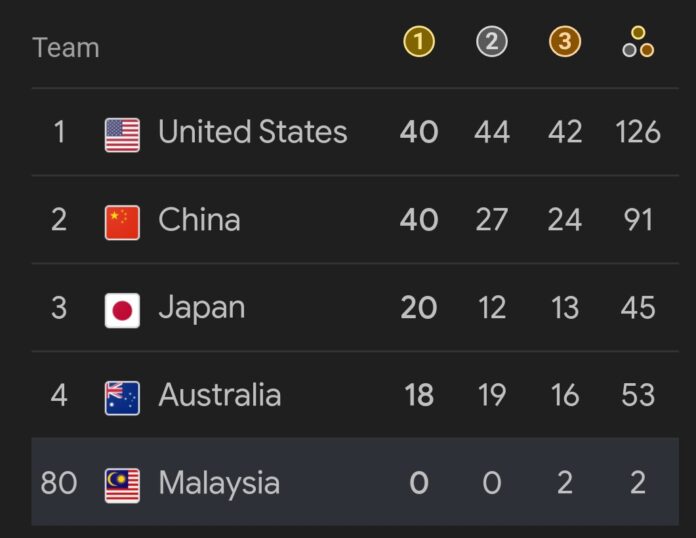By CC Pung, J.P
Tokoh Wartawan Sabah and FT Labuan
The Paris Olympics has drawn to a close.
The US and China share top spot with 40 golds each, with the US far superior on total medal count.
Malaysia sits 80th with two bronze medals.
But that’s not the news one way or another.
What is leaving a bad odour on the subject of Malaysian sports is the story about a certain Tan Sri Norza, the head of the Malaysian Olympic Committee who took his wife and child to the games.
It looks like a story of abuse of power.
It’s ironical because, as is being revealed, a national badminton player had to compete in Paris without her coach due to issue with funds.
With officials like Norza, and young Malaysian girls avoiding competitive sports due to concern over the question of Islamic-compliant sports attire Malaysia’s dream of winning its first Olympic gold seems distant.
It’ll be interesting to see how Msian sports officials read into our not-so-illustrious result in Paris.
But in the meanwhile even before the Paris Olympics closing ceremony is over, China has shown why it is cut for progress and growth.
It has begun indepth analysis, probes into success stories and shortcomings.
Officials are talking about the next Games in four years, in Los Angeles, the US.
There’s the story of a shooter who surprised his doubters to win three golds.
Being a little known from the countryside, he was not given much attention before and during the competition.
He was compared to diving sensation Quan Hongchan, 17, who repeated her successes at the Tokyo Games.
Quan is a child of a poor tangerine growing family in rural Guangdong.
She had never been to an amusement park and had not experienced fast food like kids her age.
One of her motivation to win competitions was that any prize money would help pay her mother’exyensive post-accident treatment.
Then there is the story of Zheng Qin-wen, 21, who won China’s first gold in women’s tennis in more than 120 years.
Her so-so family apparently had to risk their business and livelihood to pay for her tennis lessons since she was little.
The current World No 7 is now based in Spain
These stories and numerous others in TikTok and YouTube shared common themes, ie that an athlete”s talent needs determination, community support, bureaucracy to be nutured.
They also attributed the athletes’ success to what was described as the national resolve to ‘succeed for the motherland”.
It’s the same resolute mindset that’s behind the miraculous transformation of China from a people just coming out of the so-called “century of humiliation” to its current status as the world’s second largest economy.
Malaysia has much to learn from China.
To do that it must first admit it. Malaysia is made up mainly of Chinese, Malays, Indians and natives of East Malaysia.
China has 56 ethnic groups, among them are more than 30 million muslims.
All are in the national census and very much in the national scheme of things.
Malaysia?
Our native minorities are listed as ‘Others’ in all government official forms.
Most of very vague identity unlike China’s minorities with their names, history, traditions, cultures all officially documented.
They were part of the opening show of the 2008 Beijing Olympics.
Like the Olympic gold medal, I have a feeling that having our Borneo minorities parading at a Malaysian event is equally distant.
Editor: The views expressed here are those of the writer and do not necessarily represent the views of the talantang.com



